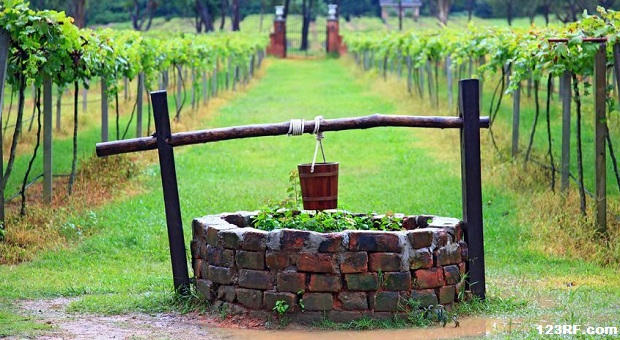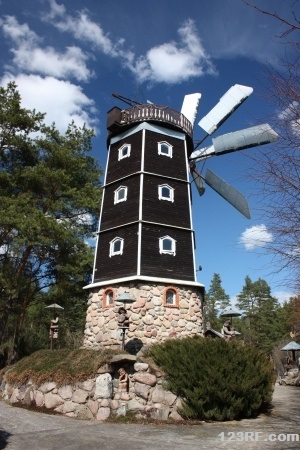I have a wonderful guest post today from the folks over at Survivopedia. I really liked this and wanted to share it with you guys. I’ll be back tomorrow with a Huge announcement. Stay tuned punk preppers.

Between high energy costs (which are expected to keep rising) and the uncertainty in the world today, the idea of going “off-grid” is gaining popularity. Preppers aren’t the only ones who are thinking in these terms, as others are seeing the potential benefits of getting off-grid and not having to pay their monthly utility bills.
Those that do end up saving a bundle on their monthly budget, as well as gaining the security of not having to depend upon our aging infrastructure.
Of course, going off-grid has different meanings to different people. Some merely think of it as becoming self-sufficient in energy requirements, while other think of totally eliminating their dependency on utility services and becoming self-sufficient in all areas of life.
A lot of this depends on where a home is located, as it has always been much easier and more acceptable to have an off-grid lifestyle if one is living in a rural environment, rather than an urban one. Farmers have always been somewhat self-sufficient, so it’s no surprise when they pull the plug.
Going off-grid is a major project which requires lots of planning and preparation. Making the transition to living off-grid isn’t easy for any of us, especially if our home isn’t designed and built for it. While it is possible to convert pretty much any home to an off-grid home, it is much easier for a home that was designed with that in mind.
Electrical Power
For most people, the biggest consideration is electrical power. We are a society that is driven by electricity.
Pretty much everything we do requires the use of electricity in one way or another.
While it is possible to forgo electricity and return to the ways of our great-grandparents, most of us don’t really want to do that. While we want to go off-grid, we still want our modern conveniences.
Basically, there are two different attitudes we can have about electricity. Either we can adopt the idea of living without electricity all together and returning to the ways of the 1800s, or we can reduce our electrical consumption, so that we can live off of the electricity that we produce ourselves with our own power generating equipment.
With that in mind, the first thing to do is to design a home that is energy efficient in all ways. The more energy efficient it is, the less energy that we need to create.
So, what are the biggest energy users in the average home?
- Heating and cooling
- Hot water heating
- Refrigeration
- Lighting
- Television and computers
- Clothes dryer
- Electric range
- Microwave oven
If we look at that list, we can find lots of ways of reducing electrical usage. For example, building an underground home with passive solar heating will go a long way towards reducing both heating and cooling costs. While we’re working on solar, we can also put in a solar hot water heater and eliminate the electricity we’re spending on that.

The second area we might want to look at is the kitchen. Three of our top energy users are in the kitchen; the refrigerator, the stove and the microwave oven. While refrigeration may be difficult to do without, we can easily eliminate the electric range and microwave, cooking over gas or wood.
While it won’t totally eliminate the refrigerator, it’s possible to get away from much of our dependency on refrigeration by building a root cellar. That can pretty much replace most of our use for the refrigerator.
A deep freeze for the frozen food will save money as well, as they are more energy efficient, especially if it is installed in the already cool root cellar. Of course, we want to make sure that we buy the most energy efficient model we can.
A clothes dryer is an unnecessary luxury, as clothing dries just fine when it is hung out on the line. We’ve gotten used to using a clothes dryer, simply because it saves us from having to walk outside to hang up the clothes and take them back down again.
The two most common means of producing electricity for an off-grid home are solar and wind. I would recommend using both, unless you are living in an area where one of them won’t work at all.
Some places don’t have enough wind to operate a wind generator, making it a waste of money to buy one. Always use a battery backup system with any power generation you do at home, so that you can have electrical power even in those times when your system can’t produce any.
Water
The second major area to consider is water and sewage; or we could say incoming and outgoing water. Water is essential for survival, so we can’t just say that we won’t use any. However, we can reduce the amount of water that we use.
The average American household uses 100 gallons of water per person per day. Of that, about 30% is used for watering the lawn, 25% for flushing the toilet, 17% for bathing and 37% for other cleaning.
By comparison, the average African family uses 5 gallons of water per person per day. While I don’t think that we all want to change our lifestyles that drastically, I think it’s safe to say that we aren’t all that efficient in our water usage.
By putting in water efficient appliances and learning water efficient ways of doing things, we can greatly reduce our water consumption, without having to make major lifestyle changes. That will allow us to use our off-grid water much more efficiently, reducing our risk of running out of water.
There are only two basic off-grid ways of getting water; from a stream or from a well. Since most of us don’t have a stream on our property, that means drilling a well. The nice thing about having a well is that if it is properly drilled, you’ll always have a good source of water. You can augment this by putting in a rainwater collection system.
Sewage
The other problem is getting rid of the waste water from our homes. If you have a septic system, you’re already off-grid in that regard. However, if you don’t have a septic tank, there are still ways of going off-grid with your water disposal.
First of all, your waste water can be divided into two parts; grey water and black water. The grey water is the waste water from your bathtubs, showers and sinks. This doesn’t necessarily have to be disposed of; it can be used for flushing toilets and watering your garden. By using it in this manner, you’ll reduce your overall water consumption.
That leaves the black water to take care of. The best and easiest way of making use of this is to put in a composting toilet or to capture this waste and put it into your compost bin, composting it along with your kitchen scraps, weeds and grass clippings. In this way, the waste becomes fertilizer to help your vegetable garden grow better next year.
Conclusion
While all that may seem like a lot of work, it’s doable. The average person with some basic carpentry and mechanical skills can do all of that themselves, making their home energy and water efficient and making it possible to go totally off the grid.
Don’t try to go off-grid without making your home more efficient, you’ll wear yourself out trying. Start with making things more efficient and then work on generating your own power and water.
That way, you’ll be able to make the conversion much more effectively and efficiently. The high cost of energy and water efficient appliances will be more than offset by the savings you will have in installing your energy producing equipment. Less energy needs means a smaller, less expensive system.
Find out more about living off the grid on “Darkest Days”.
This article has been written by Bill White for Survivopedia.
Also please enter our Reader appreciation contest and help spread the word about our blog.
Looking for the best prices and best customer service in buying Silver and Gold online? Look no further than JM Bullion for all your precious metal needs!
For all your Survival and prepping needs and bags to hold your gear check out Survival Gear Bags


Skill, knowledge, and cost-wise it is doable for many….however, it will not work in most places…at least in urban/suburban areas…and sadly in this country, even in many rural areas, due to zoning, regulations, and ignorance in our local governments.
Society has been brainwashed that everyone needs to be connected to the grid…and governments push the idea to continue to tap our connections to those services. A Florida woman recently had her home condemned due to the fact that she refused to connect to the municipal water and electric. She refused on the grounds that even if she used NONE of either, she would still be charged a fee for simply being connected.
Just like eating an elephant, if folks don’t start standing up to the oppressors, we will continue to lose our liberties…one bite at a time.
Peace,
db
Building an off-grid home is an adventure in itself. We built a passive solar insulated concrete form home back in 2007, and just finding an architect that knew anything about either passive solar or ICF was a challenge. Then after finally getting a set of blueprints, we had to find ICF builders in the area (which is more difficult since “off-grid” usually means “far from everything”), and since we never built a home before we wanted the builder to be the general contractor and manage the sub-contractors for plumbing and electrical. Not all builders will do that… Once we had the builder/general contractor, then it was off to the bank for the construction loan. ICF homes cost more to build than stick/brick homes, and passive solar (done right) requires windows with specific characteristics. You can’t just get the typical double-paned, low-E ones that are so common today and expect it to work properly. This adds even more money to the cost, but can be difficult to explain to the loan officer at the bank why your home costs so much more to build than everyone elses. This is true whether it’s the added cost of passive solar, or even just trying to roll the cost of the solar/wind system into the mortgage. This might mean a larger down payment as it did in our case. Now unless it changed in the last 10 years, off-grid home loans are non-conforming loans, so you will also need to find a bank willing to hold the mortgage paper through its life, as they can’t sell non-conforming loans to Fannie/Freddie but have to hold them on their own books. That usually adds a percent or two to the interest rate, if you have great credit. The bank will also need an address for your new home, but in my state at least, it’s the electric company that files for a new address with the county when they install the electric meter for the construction of your new home. Oops. Oh yeah, now without onsite electric for the builders, don’t forget to make sure you and they are on the same page as to who pays for the generator and fuel required during construction. And if building in cold weather, then who pays for and maintains the construction heat (drywall mud will crack in the cold and paint won’t dry properly, for example) during the inevitable delays that occur during construction, like waiting for special order material or inspections at the various phases of construction? Inspectors/inspections… Might want to spend a few minutes discussing the electrical inspection with the county electrical inspector beforehand too. He needs to sign off on the electrical portion before the building inspector will schedule the final inspection to approve your home for habitability, and he might not be very familiar with solar/wind power systems, or he might have is own rules for what’s required to approve them. The county building inspectors (building, electrical, and plumbing, at least) are the rulers of their little kingdoms, and they can generally require anything they want to – especially for non-standard constructions like this. If you weren’t planning on installing items like a standard home furnace, water heater, well/pump/pressure tank, or if you want a wood cook stove in the kitchen for example, you might want to mention these little items to the inspectors beforehand as well 🙂
Hope this might help someone avoid some of the problems we had. There’s dozens of other little things that came up as we tried to build a home that didn’t fit the mold, but I’ve taken enough bandwidth already. Like I said, it’s an adventure.
Double check with the manufacturer of your refrigerator or freezer that it will not ice up at temperatures found in your root cellar.
Putting these units on a timer with many off periods may prevent or defrost your coils.
Remember that any refrigerator or freezer works by transferring heat from inside the unit to outside the unit. If you put the freezer in a root cellar it could end up driving the heat inside the root cellar up. We had our chest freezer in a storeroom and it pushed the temperature up into the 90s. Now our chest freezer is on a screen porch.
“The grey water is the waste water from your bathtubs, showers and sinks. This doesn’t necessarily have to be disposed of; it can be used for flushing toilets and watering your garden”
…..If you want your vegetable garden to thrive I suggest not using the “grey water”. The detergents and soaps contain too many phosphates and will throw the pH of your soil out of balance. Thus killing most crops and future crops.
“That leaves the black water to take care of. The best and easiest way of making use of this is to put in a composting toilet or to capture this waste and put it into your compost bin, composting it along with your kitchen scraps, weeds and grass clippings. In this way, the waste becomes fertilizer to help your vegetable garden grow better next year.”
……Be sure to do this properly (correct ratio of green/brown, temp., and length of time). Due to the pathogens/virus that could be in the weeds from all types of insect vectors that can kill crops. Plus the human waste could harbor pathogens like chicken/cow manure if not pasturized correctly. (Dont want to get sick or die from e coli or any other disease that made its way to your vegetables)
Just wanted people to know the extra steps to use the water
Otherwise good article
Everyone should try a couple of days living off the grid to see what it is like. Just pick a weekend and turn off your electrical and water. This will show you holes in your system quick. I live in the mountains and we lose power in the winter on a regular basis. I now have a generator and really don’t go without too much except the lights in the bedrooms and bathrooms but I have battery operated push lights on all the wall in them so that’s not a problem. I have had a power loos for up to 2 weeks before having a generator and it can be an eye opening experience to say the least. Better to find out now just what needs to be done to live off the grid then when you are forced to.
A couple of thoughts…
1) Placing a freezer in the root cellar will heat up the root cellar since the coil on the outside of the freezer dissipates the ‘heat’ from inside freezer. Also the compressor creates some heat.
2) Staying connected to the grid can be beneficial even if you go self-sufficient since if more power is produced than used, it can be sold to the grid. As appliances become more energy efficient, the system installed today might become larger than what you require, making this a possibility.
I definitely plan to be on grid to make building easier and move towards off grid over time